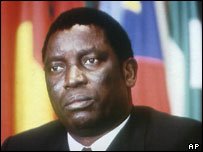The world is “shocked, shocked” that yet another African leader has upended democracy to assume absolute power over his country. When Togo’s strongman, President Gnassingbe Eyadema, died a few weeks ago, the military installed his son as leader. This contravened the country’s constitutional provisions for presidential succession. In doing so, however, the Togolese were merely following a long established practice throughout the Continent of Africa.
 In fact, from the early 1960s to the late 1990s, there have been over 75 coups and 16 presidential assassinations in Africa. That should put Togo’s undemocratic transition into perspective. Of course, nobody embodied the reign of cut-throat dictators more than the Big Dada, Uganda’s Idi Amin.
In fact, from the early 1960s to the late 1990s, there have been over 75 coups and 16 presidential assassinations in Africa. That should put Togo’s undemocratic transition into perspective. Of course, nobody embodied the reign of cut-throat dictators more than the Big Dada, Uganda’s Idi Amin.
So, despite elections in almost every sub-Saharan country, authoritarian leaders have been the African norm rather than the exception. Indeed, many leaders emulated the serial electoral farce Mobutu Sese Seko perpetrated to hold onto power in the DR Congo for over 30 years.
But a transformation of consciousness amongst the African people is making the Mobutu paradigm much less viable for new leaders. Case in point, as soon as the military installed “Baby Eyadema”, mass protest began not only in Togo but also throughout many African countries. Regional pressure from ECOWAS (organization for Economic cooperation of West African States) and South African President, Thabo Mbeki – the Continent’s most powerful democratic leader, is forcing the Togolese military to shift their allegiance from Eyadema to Togo’s Constitution.
Nevertheless, much of sub-Saharan Africa remains mired in post-colonial malaise. And, even in countries like Kenya where multi-party democracy is taking root, leaders are beset by accusations of corruption, cronyism and dictatorial fiat. Indeed, Robert Mugabe of Zimbabwe stands as a conspicuous reminder that curing the African pathology of authoritarian leadership will take a little more time.
News and Politics
Leave a Reply
You must be logged in to post a comment.